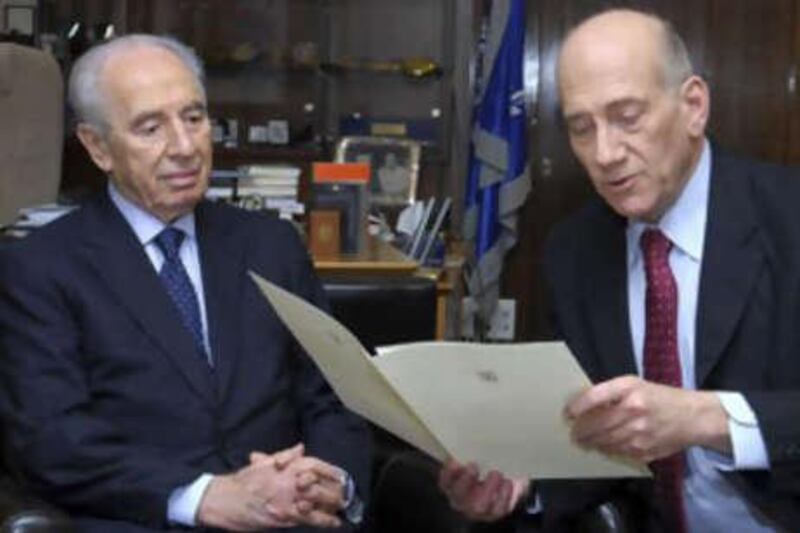TEL AVIV // Ehud Olmert, Israel's corruption-tainted prime minister, announced his resignation today in a move likely to throw the Israeli political arena into weeks of uncertainty and cast a further shadow on peace talks with the Palestinians. Mr Olmert's announcement came four days after he was replaced as head of Israel's ruling Kadima party by Tzipi Livni, the Israeli foreign minister, who narrowly won the centrist party's internal election last week. Mr Olmert said in July he would quit once Kadima chose a new leader as he faces possible criminal indictment in corruption probes. Mr Olmert will remain caretaker prime minister until a new government is formed through a coalition deal or elections. His move, while expected, set off a tumult in Israel's top political parties. Scepticism arose over whether Ms Livni could succeed in forming a multiparty coalition that would hand her a comfortable majority in Israel's 120-member parliament. Failure would lead to early elections, which recent polls indicate may result in the right wing Likud party ousting Kadima from power. Speaking at a weekly cabinet meeting in Jerusalem, Mr Olmert said the decision to quit was not "easy or simple". Shaking the hand of Ms Livni, who was seated next to him, he said he hoped she "will succeed in forming a national government with the composition she wants" and that he would support her. But so far, Ms Livni's path to the premiership appears anything but smooth. Shimon Peres, Israel's president, received Mr Olmert's official letter of resignation and was due tonight to begin meeting with the four largest parliamentary factions to decide which party leader has the best chance of forming a coalition. It was unclear whether Mr Peres would have enough time to make a decision before travelling to New York this week to attend the UN General Assembly. While analysts expect Ms Livni to be tapped by the president, they question whether she will succeed in putting together a new government in the six weeks time frame. Her allies have said she would opt to keep the current coalition, which includes the traditionally centre-left Labor party, the tiny Pensioners Party and the ultra-orthodox religious Shas. But Labor, the key coalition partner and the second-biggest parliamentary party after Kadima, is not rushing into another marriage. Ehud Barak, Labor's chief and a former prime minister who is eyeing a return to the government's helm, appears to prefer a national government that includes all three major parties - Kadima, Labor and Likud. Last month, Mr Barak said Israel would need a wide government in light of the threats it is facing on the security front - including from Iran's nuclear programme, from the Islamic group Hamas in the Gaza Strip and from Hizbollah guerrillas in Lebanon - and in the economic arena given the US financial crisis. But commentators say Mr Barak, currently Israel's defence minister, is bidding for time to try to catch up with the wider popularity of Ms Livni and the hawkish Likud leader, Benjamin Netanyahu. Yoav Karkovsky, a political correspondent for Israel Radio, said Mr Barak's proposal would hinder any party leader from boosting his or her public support because "everyone will be on equal footing and in the same governmental quagmire". Labor officials said that should a wide coalition not be possible, they would push for a national ballot. But those statements drew criticism because polls show Labor is unlikely to emerge victorious in a general vote. "Ehud Barak decided ? to throw the Labor party down and commit suicide," Chaim Oron, chairman of the left wing Meretz party, told Israel Radio. But Labor is not the only party that is reluctant to team up with Kadima in a coalition. Likud officials yesterday insisted that Israel should call for new elections, apparently to take advantage of their leader's favourable lead in the polls. Additionally, Ms Livni - the chief negotiator with the Palestinians - may find it hard to accept demands by Shas, which opposes joining any government willing to discuss sharing Jerusalem with the Palestinians. Jerusalem is a key topic in the peace talks because Palestinians want East Jerusalem as the capital of their future state. While Israeli politicians bicker, prospects for a deal with the Palestinians appear dim. Those negotiations, kick-started at the Annapolis summit last November, have yielded few tangible results and seem unlikely to achieve a US-backed goal of a framework for a peace pact by the time George W Bush leaves office in January. Mahmoud Abbas, the Palestinian president, warned in an op-ed piece in The Wall Street Journal on Friday that time for a two-state solution for the Israeli-Palestinian conflict was fast running out. "If we do not succeed, and succeed soon, the parameters of the debate are apt to shift dramatically," he wrote. "Israel's continued settlement expansion and land confiscation in the West Bank makes physical separation of our two peoples increasingly impossible." The op-ed appeared to be aimed at the White House as it was written ahead of a scheduled meeting on Thursday between Mr Abbas and President Bush. vbekker@thenational.ae
Olmert quits, successor is unclear
Israel's president Shimon Peres receives the PM's resignation, throwing the Israeli political arena into uncertainty.

Editor's picks
More from the national




